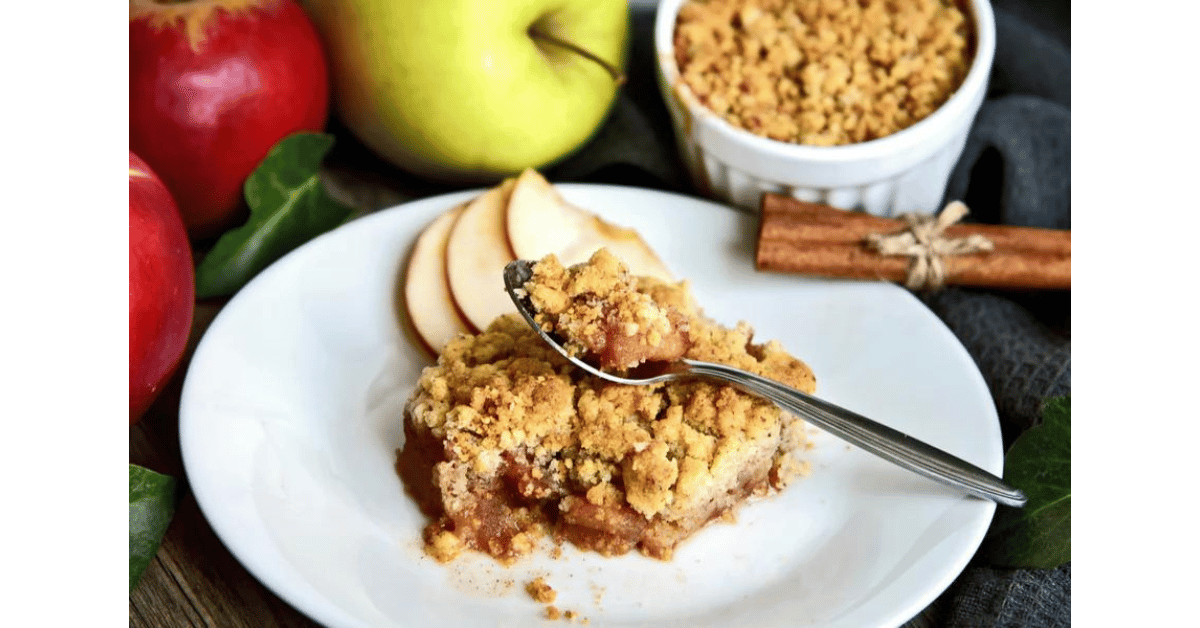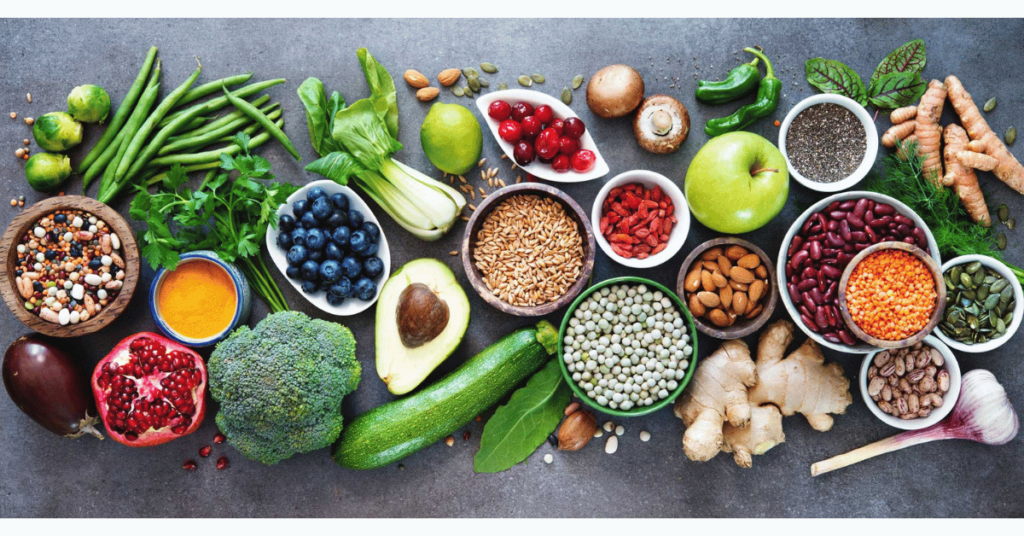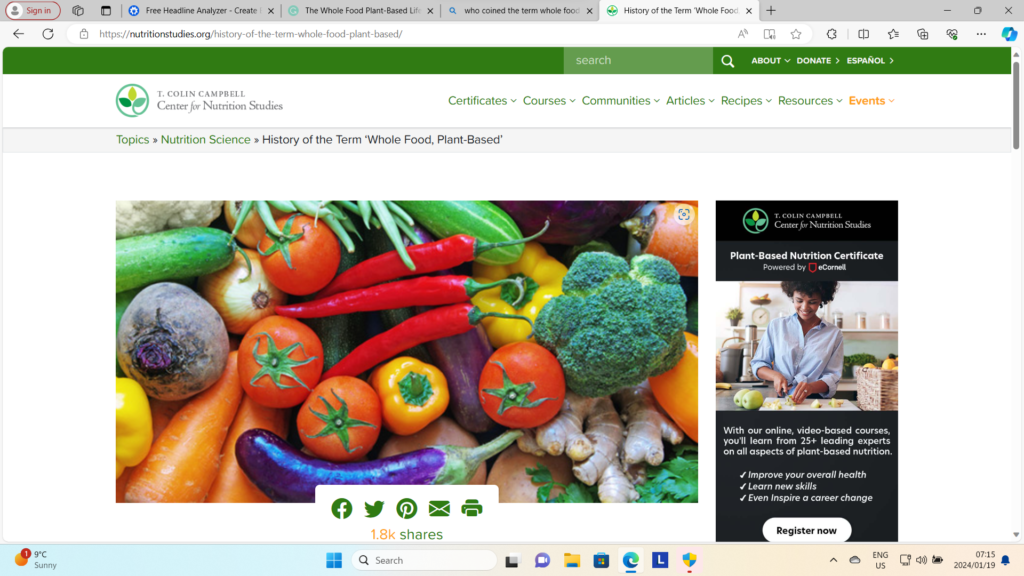The Whole Food Plant-Based Lifestyle: A Beginner’s Guide (2024)

Introduction
Is whole food plant-based lifestyle something you need to know about?
Maybe your friend was bragging about the recent diet trend on how you can live a long, healthy life.
No matter your motive, you’ve come to the right place.
Here’s what we’ll investigate in our Beginner’s Guide on Whole Food Plant-Based Lifestyle.
- What is a Whole Food Plant-Based Lifestyle?
- When and where did the Whole Food Plant-Based Diet come from?
- What do you eat on the whole food plant-based diet?
- Will I live a healthy, long life on WFPB?
- Easy Whole Food Plant-Based Recipes.
- Can I drink coffee (or other caffeine-containing drinks) on WFPB?
- Frequently asked questions on the whole food plant-based lifestyle.
It’s quite a mouthful!
Let’s start from the beginning.
What is a Whole Food Plant-Based Diet

A whole food plant-based diet is not your average trendy diet.
It’s a lifestyle that focuses on consuming plant-based foods. These include fruits, vegetables, whole grains, legumes, nuts, and seeds.
As you eat your WFPB foods, you minimize or cut animal products and processed foods.
Now:
You must also eliminate oil.
Why’s that? Will my food be tasty?
(More on that is coming)
Experts discussing the Whole Food Plant-Based Diet will attach the words “heart disease reversal” and “healthy longevity” to it.
That’s why WFPB is a go-to lifestyle.
Who DOESN’T want to live a long, healthy life?
Every item listed above falls into the whole food category. When I say whole food, I mean stuff from the ground and that which grew on a tree.
Here’s another way:
If your great-grandpapa from the country wouldn’t recognize it as food, it doesn’t fit into WFPB.
What Now?
Coca-Cola, Donuts, and Fries! Forget them.
Researchers have linked the diet to several benefits. These benefits include reducing cardiovascular disease. They also help keep cognitive abilities to stave off dementia.
At this point, you might be wondering:
If Whole Food Plant-Based Diet is so good, how can it help me?
I got you, don’t panic.
When and Where Did the Whole Food Plant-Based Diet Come From?
Believe it or not, a tourist in Okinawa, Japan, didn’t create this diet.

The whole food plant-based diet has gained popularity recently. However, its roots trace back to ancient civilizations.
Vegetarianism started in the 6th century by a Greek philosopher and mathematician, Pythagoras.
At the same time, Siddartha Gautama (Buddha) was a nobleman and religious leader. He was a vegetarian in India. He spread his diet to his followers.
Many cultures, the Greeks, Romans, and Asian populations, have eaten plant-based diets.
In the 19th and early 20th centuries, influential figures like Sylvester Graham and John Harvey Kellogg advocated plant-based diets. They did so for health and ethical reasons.
Do you know the name, Dr T Colin Campbell?
But who coined the term “whole food plant-based”?
Sure, veganism started some time ago.
However, the research done by Dr T. Colin Campbell and his colleagues led to the derivation of this name.

Dr. T Colin Campbell used “plant-based” and “whole” as keys to this lifestyle. He distinguished the WFPB lifestyle from other vegan and vegetarian diets.
What do you eat on the WFPB diet if it’s not vegan or vegetarian?
What Do You Eat on a Whole Food Plant-Based Diet
As I already pointed out, the Whole Food Plant-Based Diet focuses on REAL WHOLE foods.
Yes. That’s why I like it.
You may be asking. “ZZ” doesn’t a whole food plant-based diet have limitations?
It sounds limiting, but many whole foods and plant-based ingredients are available.
- Condiments: Vinegar, nutritional yeast, mustard, salsa etc.
- Drinks: Coffee, tea, kombucha, sugar-free sparkling drinks
- Fresh or dry chilli peppers
- Fresh or dry herbs and spices.
- Fruits and vegetables can be fresh, frozen, fermented, or dried. Check the labels for added sugar and oil.
- Legumes: Beans and lentils of all kinds
- Mushrooms
- Nuts and seeds
- Other plant-based proteins: Tofu, tempeh, whole-foods vegan meats (oil-free, free from protein isolates)
- Starchy vegetables: Potatoes, yams, sweet potatoes
- Unprocessed sweeteners: Date syrup, maple syrup etc.
- Unsweetened plant-based milk
- Vegan cheese: Look for oil-free cheeses made from nuts or seeds.
- Whole grains and Pseudo grains: Brown rice, farro, oats, quinoa, amaranth, wild rice
- Whole grain bread and tortillas: Be easy on these.
- Whole-grain pasta or noodles
Which brings me to my next point…
Foods Not Allowed on a Whole Food Plant-Based Diet
Remember the most essential rules of whole-food plant-based diets. They are no oil, salt, processed sugar, or processed grains.
- Dairy products: Milk, yoghurt, etc.
- Drinks: Soda, soft drinks, and juices
- Eggs
- Meat and fish
- Oil: Sauté with vegetable broth instead
- Packaged foods are not whole foods plant-based. Most ready-made meals, chips, puffs, candies, and cereals have added oil, salt, and sugar.
- Processed sugar and sweeteners: White sugar, brown sugar, pancake syrup
- Processed vegan meats and cheeses: Oil and salt are out.
- Salt: Salt of any kind is not encouraged
- Vegan ice cream usually contains oil and processed sugar. There are a few exceptions.
- White grains, pasta, tortillas, and bread: This includes rice, too.
Make sure to distinguish the trees from the forest.
Focus on the big picture of the WFPB lifestyle and eat for a long, healthy life.
Will I Live a Healthy, Long Life on the Whole Food Plant-Based Diet?

Unsplash/Tyler Nix
Research indicates that a plant-based diet is vital for healthy longevity. The diet consists of unrefined plant-based foods.
A whole food, plant-based lifestyle may be the most critical prescriptive tool. It may help patients. Helping patients achieve a longer life and better quality of life as they age.
Who wants to live longer while suffering from sickness?
A whole food, plant-based lifestyle helps you prevent chronic diseases.
Plant-based foods are the cornerstone of healthy longevity. They are essential to help patients achieve a longer and better quality of life as they age.
Easy Whole Food Plant-Based Recipes
What kind of food is that without oil and limited salt?
Need some help figuring out what all this will look like on a plate?
I mean, real food to eat.
I like you as a person. That’s why I researched. I found some super simple recipes for the Whole Food Plant-Based Lifestyle.
- Chickpea Curry Stew with Kale
- Lentil Vegetable Soup
- Best Vegan Mashed Potatoes
- Roasted Vegetable and Quinoa Harvest Bowl
- Roasted Broccoli, Sweet Potatoes, Chickpea Salad
But wait.
What about adding some desserts?
- Maple and Cinnamon Roasted Pineapple
- Dates, Coconut and Almond Energy Balls
- Easy Baked Cheesecake.
- Berry Smoothie Bowl
Oh, Yummy!
Want to know the best part?
You can eat all these delicious dishes and get health benefits.
The Health Benefits of a WFPB Diet
Reduced Risk of Chronic Diseases
Adopting a whole food plant-based diet has reduced the risk of chronic diseases. Diseases like heart disease. Embracing this lifestyle also reduces type 2 diabetes, certain cancers, and hypertension.
This reduction results from fibre, phytochemicals, and antioxidants in plant-based foods.
These antioxidants help protect against oxidative stress. They also protect you from inflammation and cellular damage.
Weight Management and Obesity Prevention
Who doesn’t want a lean, mean body and no belly fat?
This is wild.
Maintaining a healthy weight becomes more manageable with a whole food plant-based diet.
The emphasis is on whole, unprocessed foods that are low in calorie density and high in fibre. Nutrient-dense foods help to promote satiety. It also helps control cravings and reduce calorie intake.
When satiety and cravings are in check, you’ll manage your weight and avoid the risk of obesity.
For winning on weight loss, you deserve applause!
Improved Heart Health
Heart disease is the number one killer globally. This pattern includes developing countries. Did you know that?
Now.
A whole food plant-based diet has shown significant benefits for heart health.
WFPB diet emphasizes eating whole foods such as fruits, vegetables, whole grains, and legumes. It also emphasizes minimal or no animal products.
These foods help lower cholesterol levels. They reduce blood pressure and decrease the risk of heart disease and stroke.
Enhanced Digestive Health
Here comes WFPB diet…
Plant-based foods are naturally fibre-rich and crucial in maintaining a healthy digestive system.
A wfpb diet can help prevent constipation. It can also promote regular bowel movements.
It also supports a diverse gut microbiome, contributing to optimal digestive health.
Here’s the exciting part…
Can I Drink Coffee (or other caffeine-containing drinks) on My WFPB Lifestyle?
Yes, you can include coffee in your whole food plant-based lifestyle.
But seriously, let’s talk about caffeine.
One concern often arises when following a plant-based diet. People worry about the lack of energy, especially in the mornings.
This is where caffeine comes in.
Caffeine is associated with coffee and other animal-based products. However, several of the best whole-food plant-based alternatives can boost much-needed energy.
One of the best whole-food plant-based alternatives to caffeine is green tea.
The Camellia sinensis plant leaves make green tea. It is rich in antioxidants and polyphenols. These compounds improve brain function. They increase energy levels and promote fat burning.
Green tea has less caffeine than coffee. It’s a healthier choice for those looking to reduce caffeine intake.
Moreover, green tea’s anti-inflammatory properties reduce the risk of chronic conditions. Researchers have made this connection.
There’s more…
Maca powder is another option for a whole food, plant-based, and caffeine alternative.
Maca is a root vegetable which originates from the Peruvian Andes. For centuries, people have used it for its many health benefits.
Maca powder is vitamin-rich and contains minerals and essential amino acids. They help improve energy levels and focus. Additionally, maca contains adaptogens. They help the body adapt to stress and regulate hormone levels.
Maca powder is an excellent choice for those looking for a natural energy booster. It doesn’t have the side effects of caffeine.
Let me tell you, it gets better.
Chia seeds are another option for a whole food plant-based and caffeine alternative.
Nutrients pack these tiny seeds. Nutrients include fibre, protein, and omega-3 fatty acids.
Chia seeds slow carbohydrate digestion. It gives a steady release of energy throughout the day.
Eating chia seeds in the morning can give you lasting energy without the caffeine crash.
So, there you are.
The whole-food plant-based caffeine alternatives include green tea, maca powder, and chia seeds.
These essential nutrients pack these options. They provide sustained energy without the crash linked to caffeine.
Adding these alternatives to a whole food plant-based diet can help improve health.
But is this all there is in this lifestyle?
Challenges and Misconceptions About Whole Food Plant-Based Lifestyle
Meeting Nutritional Needs on a Plant-Based Diet
A concern about a whole food plant-based diet is its provision of all the necessary nutrients.
The good news is that you can meet your nutritional needs on a plant-based diet. It would be best if you had proper planning and variety.
You can get all the essential vitamins, minerals, and protein.
This diet can also give you healthy fats your body needs. It includes various fruits, vegetables, whole grains, legumes, nuts, and seeds.
Say goodbye to worries about malnourishment. Say hello to a colourful plate of vitality!
Addressing Concerns About Protein and Calcium Intake
“But where do you get your protein?” is frequently asked by those sceptical of a plant-based diet.
People ask, and they need answers, you know…
Contrary to popular belief, plant-based foods can provide ample protein. Legumes, like beans, lentils, chickpeas, tofu, tempeh, and seitan, are excellent plant protein sources.
Leafy greens, fortified plant milk, and calcium-set tofu can boost your calcium needs.
So, no more worrying about protein deficiencies or frail bones when fuelling with plants.
Overcoming Social and Cultural Obstacles
Social and cultural factors can sometimes make transitioning to a whole food plant-based lifestyle challenging.
Family gatherings, work events, and dining out with friends may become trickier. But you can navigate these obstacles with a positive mindset and some preparation.
Be open about your dietary choices and communicate your needs. Offer to bring a plant-based dish.
Educate your loved ones about the benefits. Show them how delicious plant-based meals can be.
Remember, humour and flexibility can make your dietary journey enjoyable and sustainable.
Frequently Asked Questions About Whole Food Plant-Based Lifestyle
Is a Whole Food Plant-Based Diet for All Age Groups?
A whole food plant-based diet can suit people of all ages.
It provides essential nutrients and can support optimal growth, development, and health. However, it is vital to ensure adequate intake of essential nutrients. These include vitamin B12, iron, calcium, and omega-3 fatty acids. Specific age groups may need extra attention for these nutrients.
Consulting with a doctor or registered dietitian who promotes a whole food plant-based lifestyle can provide personalized guidance.
Can I Get Enough Protein on a Whole Food Plant-Based Diet?
– Can I get enough protein on a whole food plant-based diet?
Yes, a whole food plant-based diet provides proteins. Plant-based protein sources are available. Proteins from legumes, tofu, tempeh, seitan, quinoa, and nuts are excellent protein sources.
Adding various plant-based protein sources into meals makes it possible to meet daily protein requirements.
A well-balanced whole food plant-based diet typically provides adequate protein intake without supplementation.
How Can I Get All The Necessary Nutrients on a Whole Food Plant-Based Diet?
A whole food plant-based diet provides a wide range of nutrients. Paying attention to specific nutrients that may need special consideration is essential.
These include vitamin B12, iron, calcium, iodine, and omega-3 fatty acids.
To meet nutrient requirements, you can incorporate fortified foods like plant-based milk or cereals. Fortified foods contain added nutrients, such as vitamin B12. Also, ensure you include a variety of nutrient-dense plant foods in your diet.
Can A Whole Food Plant-Based Diet Be Affordable?
WFPB diet can be an affordable choice.
Plant-based staples like whole grains, legumes, and seasonal fruits and vegetables are cheaper than animal products.
Focusing on locally sourced and affordable plant foods, planning meals, and cooking at home makes it possible to follow a whole food plant-based diet on a budget.
Additionally, purchasing ingredients in bulk, using canned or frozen produce, and exploring farmers’ markets or community-supported agriculture (CSA) programs can further reduce costs while promoting a whole food plant-based lifestyle.
Conclusion
Alright, enough talking…
Let’s hear from you…
You’ve read the whole food plant-based lifestyle guide.
And if I left something of concern to you, give me your comment.
Let me know if you have any more questions. Please start your Whole Food Plant-Based lifestyle today.
Cheers!

2 thoughts on “The Whole Food Plant-Based Lifestyle: A Beginner’s Guide (2024)”